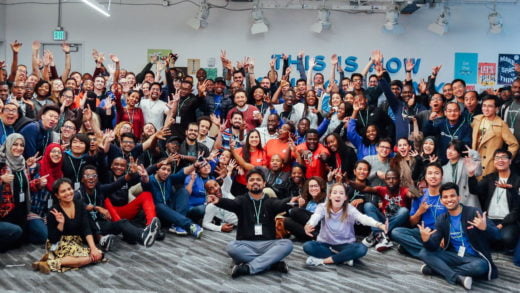Throughout school, I was a bookworm and an introvert. “Socializing” was not my cup of tea. I was never really sure about how to drive any deep conversations or connect with another person. As an introvert, every time I tried doing so, my self-doubt and social anxiety would creep in. I felt as if I might sound extremely weird, boring, or that the other person might judge me. These thoughts kept me from freely opening up about myself.
I often thought: “If I manage to be good at my work and communicate the same, it should be enough to reach where I want to. Why make deep conversations?”.
Thus, I often neglected my interpersonal skills.
Plot twist – The story that led me to reconsider things
In my final year of school, I found myself clouded with many negative thoughts. This even affected my academic performance. I started oversleeping. I could not find anyone to share my thoughts with. I constantly had the fear that no one would relate to me.
However, I learned to deal with those thoughts during my drop year by connecting with spirituality and analyzing things deeply. It also made me realize that things needed to change. I was not going to keep to myself.
So, when my college started, as part of my growth plan, I decided to go out of my comfort zone every time I got the chance. I had several great conversations with my colleagues, members in communities and conferences, and even those pursuing completely different career paths. As a result, I found some great mentors, lifetime buddies, and many meaningful connections who continue to inspire me.
All throughout, I have realized some common behavioral patterns while having these conversations. I now find myself a lot more comfortable walking into situations and striking a conversation, or even driving them with no/minimal anxiety.
But why should I be good at this art of deep conversations and have meaningful connections?
You are ultimately going to work with people and for people, directly or indirectly. You have to learn to empathize.
It enables you to do better teamwork and bring out great products.
On a personal level, meaningful connections are liberating. They can help accelerate your process of knowing yourself better and also help keep your stress levels in check.
We all help each other grow. You learn to support the people around you even if you cannot fix their problems.
The list can go on.
All this prompted me to reflect on things that worked out. I was eventually able to derive 15 lessons that I will be sharing in this blog post.
I am not claiming to be an expert, there are still many lessons to be learned. But I hope these lessons help you out if you struggle with having a great conversation with anyone. Or if you are having trouble in maintaining meaningful connections, the way I used to do.
Some of these points are great life advice too.
1. Accept yourself the way you are
Yes, it all starts with you!
Over the years, I have realized that self-acceptance helps you comfortably become a part of any conversation. When you start being true to yourself and embrace your uniqueness, it solves your self-esteem issues. And you stop seeking validation from others.
Self-exploration takes time.
Enjoy your own company. Reflect upon your strengths, weaknesses, values, ambitions, behavior, and things you need to fix within yourself. This would keep on evolving as you continue to learn, unlearn, and relearn things.
Know that you matter, that you can add value and your story is worth listening to. Give yourself those affirmations you seek from others.
Do not try to imitate a person. If their personality inspires you, bring their good habits/traits into your routine, and see what works out best for you!
2. Be curious
Being curious definitely helps you professionally. Curiosity helps in grasping new concepts and exploring how different things work. It can also do wonders on a personal level. Approaching every interaction with genuine curiosity helps you connect better with others, including strangers, and drive conversations naturally.
“When curiosity is alive, we are attracted to many things; we discover many worlds.” –Eric Booth
Being curious makes you more observant. You tend to actively listen and take a genuine interest. It drives you to ask better and more intriguing questions that make people think. For example –
Let us say someone mentions one of their future goals as moving out to US/Germany and work there. You can respond in two ways:
“Oh, amazing. I hope that happens soon.”
or:
“That sounds great. Though I would love to know what made you choose US/Germany over any other country. Have you been there before? Or anything specific you admire about them?”
The first phrase would rush your conversation directly to the end. The second one will drive the flow naturally. It will make the other person open up more. You can end up learning new things about these countries that you were not aware of.
Curiosity makes you look beyond superficial. You do not assume. You seek clarity for things you might have misunderstood.
But, avoid being too interrogative and prefer open ended-questions over simple yes/no ones.
Socially engineer the other person, appear more open and interested. I do not think I can explain it better than Gilfoyle explaining it in this episode of Silicon Valley xD
(I just love this character from Silicon Valley.)
3. Learn to empathize with others
“Empathizing is the ability to understand emotions in others and share their feelings”.
Empathizing is important. You should try actively listening to a person and imagining yourself in their situation to see how they would have felt. Recognize their emotion, understand, and acknowledge their pain points.
Sharing your own experiences instead of critiquing. A shared perspective makes the other person feel understood. It builds a level of trust with the other person. You can learn to empathize by starting to acknowledge and naming your own feelings when you have them.
Do not sympathize, Empathize!
Few things to keep in mind: Empathizing doesn’t require you to always have a solution to someone else’s problem. Rather, it is listening to them actively. Make them feel understood, which will prompt them to open up and seek advice.
Here is an interesting read on empathy and how to empathize in different situations.
What if the other person is way too negative about things that annoy you?!
In such cases, be honest with them by conveying how you feel about it. You don’t always need to agree with the other person to acknowledge their perspective. If a person just repeatedly complains without taking any action, you know they are someone you will not connect with deeply and that’s totally OK.
4. Allow yourself to be vulnerable
As per a research conducted by Dr. Brene Brown, vulnerability is the root of human connection. Yet, we are taught to hide our true emotions, struggles, and portray ourselves as a “normal” confident being. We avoid being vulnerable due to the fear of getting betrayed. Or as quoted by Dr. Brown – minimizing “uncertainty, risk and emotional exposure”.
I highly recommend watching the widely viewed Ted talks by Dr. Brown to learn the Power of vulnerability:
As she mentions, when we allow ourselves to be vulnerable, it opens us to joy, love, gratitude, empathy, and connection. Vulnerability is not about disclosing a big, dark secret but saying things that are difficult for you to share. It is not a sign of weakness but rather indicates that you are strong enough to admit your true emotions. It is OK to feel low, to show your humanistic side.
There is also a price that we pay for invulnerability:
If you want the other person to open up, you yourself need to be vulnerable first. Everyone wants to be heard. They just need a safe space and trust factor to talk about their struggles.
Put your ego and pride aside. Do not try to always be in control. When you allow yourself to be vulnerable first, you create this safe space for the other person to do the same naturally. But, never mishandle this information or use it against that person, it can make them feel worse.
We choose to sympathize to avoid feeling vulnerable. Empathizing (#3) requires a sense of vulnerability and sharing your own story. But do not overshare or dwell too much on the negative. Have a sense of awareness as to when to open up.
5. You cannot please everybody, and you should not even try to
While on the journey of forming long-lasting meaningful connections, it is essential to get rid of toxicity. Stay careful about who you get close to. I am very thankful to a friend who gave me this bold advice last year while going through a sour experience:
Leave people who drain your energy and those who do not add any value. The people who bear unusual behavior that makes you feel uncomfortable and who do not respect your boundaries even if you have clearly stated them are best avoided.
The way you want to be treated is totally in your hands. Never compromise on your mental peace.
“Do not deny the signs, vibes, and energy you feel about certain people and situations. If it’s not right, it’s not right.” – Idil Ahmed
There is another perspective to this point, in terms of the effect of the ease with which we connect via social media at our fingertips. You do not need to be available all the time to reply to messages. Many people time your responses, expecting you to reply within minutes. But, those who really wish to connect must respect your time. They should understand that you might be occupied. They will surely reach out again or call you up for any urgent help instead of taking things in a negative way. Never compromise on your “me” time.
6. Do not beat yourself up
If a conversation went awkward or did not go as expected, that does not mean that you are awkward. There might be many hidden factors around it, due to which it did not go well. Do not give it a lot of thought. If you did something embarrassing, laugh at your own mistakes. Derive the lessons from that interaction and move on.
No one would continue to think about you. Everyone has their own life to deal with. One of my learnings from the book: “The Subtle Art of Not Giving a F**k” and what I firmly follow is – The world does not revolve around you and this is the best thing you can tell yourself.
7. Stay Authentic
Express your true self in every conversation. It frees you from bottled up emotions and attracts people who value you for who you are. Do not pretend to be someone else just to feel accepted. It is the differences amongst us that make every interaction a new learning experience.
But don’t be too full of yourself. Keep a check on your behavior, align it with your finely honed set of values.
It indeed takes courage to express your core beliefs unapologetically, but that is the only way towards authenticity. Share your opinions calmly while being open to others’ opinions too.
I observed that when I started voicing my opinions, even if they did not align with others’ views, I was respected for the perspectives I brought to that discussion. But remember, if your thoughts are not respected in a group, you definitely do not belong to that group.
Imagine how boring it would be, had we all been similar!
8. Put yourself out there, join communities
Joining communities helps you connect with like-minded people with common interests. This enables you to start conversations naturally. I joined different college societies and multiple technical communities in my region that helped me connect with many people. Communities provide you a safe space and community members celebrate you for who you are. Once that happens, you find it easier to talk to people with diverse backgrounds.
“Technical conferences are where a group of introverts gathers to cosplay extroverts.” – Larry Garfield
Put yourself out there. Be open to new experiences.
Start small. Strike a genuine conversation with 2-3 people you did not know before. Take a chance on yourself.
9. Prepare Yourself Proactively – Do Your Groundwork
a) Have the right mindset before approaching any conversation. Negative self-talk can be the primary reason for social anxiety. You have the power to choose your thoughts. Instead of doubting yourself, use affirmations like: “I am getting better at this”, “it is going to be a new learning experience”, etc. until you get better.
Remember, “everyone is an imposter and no one is as perfect as they may appear”, and you are just talking to different versions of yourself.
b) Connect with people on LinkedIn/Twitter to know them better, especially when you plan to attend any professional event. This can help you ask better questions when you meet in-person. Also, have an elevator pitch ready before attending any such events.
c) Initiating a conversation with a new person can be intimidating. Think of topics you will be comfortable talking about. Do not prepare a script. Be curious (#2) during the conversation to drive the flow naturally.
You can use the FORD technique, an acronym for Family, Occupation, Recreation, and Dreams. These things matter the most to almost everyone. Have a couple of open-ended questions for each category and you should be able to have a lasting conversation with anyone you meet.
d) Give longer answers (in terms of what and why) than you usually would give in 1-2 words. It can even help you learn more about yourself. For example: If someone asks: “How is it going?”. Instead of saying: “Good. You?”, reply: “Good. I was finally able to finish that blog and it feels so great”. You can then carry a conversation as per the response of the other person. One of the articles around big talk and skipping small talk was something I found useful in understanding this concept better.
10. Stay updated, expand your knowledge and add value
Having diverse knowledge and interests allows you to keep up with a variety of discussions. Otherwise, you will have very little to talk about except for your work or about yourself. Informed people are more engaging and fun talking with.
It is impractical to be a “know-it-all” person. Admit what you do not know. You can enlighten each other with your good understanding of something. Stay updated with current affairs, politics, and things happening locally, etc., as many conversations naturally veer to these areas.
I personally avoid having a discussion around politics since some people get triggered easily and it ends up being a heated argument. But, trust your vibe in such cases. A few months ago, I had a 2-3 hour long discussion around a political topic with some friends, and it was a blissful one. There were no arguments, rather a healthy debate based on facts, similar incidents in history, etc. I learned new things and perspectives I had never thought of.
Other potential topics for conversations include philosophy, intellectual discussions around recent trends in your domain, your interests, or discussions around a ted-talk, tv-series, documentary you recently watched, etc.
But, while consuming content, do not jump between topics like a flash, in fear of missing out. Take time to absorb the content. Question things, derive new learnings and perspectives and take notes for better retention.
11. Listen actively
Deep conversations involve giving your undivided attention to them and actually listening to what the other person has to say. Use appropriate body language. Take part in the conversation by rephrasing, empathizing, and asking relevant questions.
Many of us fail at this, which rather should be a very basic etiquette to follow. We resort to multi-tasking. We join a conversation with some preoccupied thoughts replaying in our mind or use our phone while the other person speaks, which is so disrespectful. I had this bad habit until a friend pointed this out a few years back.
Start listening actively. Make the other person feel heard and understood. Great conversationalists are active listeners.
12. Strike a balance between giving and taking
A conversation can get boring when only one person is doing the talking, which is not active listening (#11). If you wish to connect with someone on a deeper level, it is equally important to share things about you. Sometimes you have a friend who is mostly self-centered and shows less interest in your side of the story. In such cases, give them honest feedback without worrying about them walking out of the friendship.
13. Drop genuine compliments. Give credit where due
Give a sincere compliment to the people you meet instead of ‘buttering’. Everyone loves genuine appreciation. If you get to talk to a person whose work you truly admire, tell them how you find their work worth following. It uplifts the other person to keep doing that great work.
For instance, I absolutely loved the talk of one of the speakers at a conference. But, I did not agree with one of the points they shared. So during the break, I approached them and told what I liked the most in their talk and also sought clarity on the other point that I did not agree with. This initiated a fruitful discussion and we both are still in touch.
This point applies on a personal level too. If you truly cherish your friendship with someone, let them know. Celebrate their success and derive motivation. Allow people in your life to shine in their own best light. Spreading good cheer is contagious.
Also, seek opinions or ask for a favor from people you connect with if they have the expertise or more awareness about something. Give people authority for their work.
14. Ping people once in a while
If you wish to stay connected with someone on a deeper level, you need to invest in some time. Do not take your friends for granted. Wisely choose who you wish to keep in your close circle, the ones you can be most vulnerable with.
Staying connected via social media helps. You do not have to chat all day long and kill each other’s time. Instead, regularly check-in with them. You can talk about how your day went. Let them know if you were thinking about them. Regularly share music, memes, or any other thing you have a common interest in. Seek their opinion on something that is bugging you. Call them once in a while. Uplift each other in your respective journeys. It is easier to maintain an existing bond than rekindling it after years when you have completely lost touch and have grown apart.
15. Humor appeals to all of us
Using healthy humor in our regular conversations makes us more approachable. You can even get your idea across more effectively with a pinch of humor (It works wonders while giving talks as well!).
It can also help you navigate many awkward situations. You can communicate your difficult thoughts or bitter truth without hurting the other person, enabling them to take it lightly.
Learn to laugh at your own missteps and moments of awkwardness. A shared taste in memes can help you connect with the other person much easier. And if you are not particularly good at this, you can always enjoy the humor and go with the flow.
Also, avoid being that person who laughs at someone’s limitations or insecurities. Be inclusive of people around you.
The Bottom Line
Remember, not every conversation will go well, no matter how better you get. Do not beat yourself up (#6). There might be days when you will not feel like talking to anyone. Know your limitations. Do not feel pressure to talk to a person when you need some space.
Like any other skill, conversational and interpersonal skills cannot be developed in a day. But you can eventually get better with practicing and experimenting. You can try to follow 1-2 of the above-mentioned points at a time until it works well for you. Trying to implement them all together will need a lot of will power. And it might kill your motivation too early for not being able to follow them all at once.
Also, these are the lessons I derived based on my experiences. If you have a different opinion or any additional lessons that helped you get better, do share them in the comments below.
And if you found this blog helpful, do share it with other introvert friends of yours to help them out too! 🙂



















